Edie Melson's Blog, page 146
November 1, 2021
What Does Your Character Want?

by PeggySue Wells @PeggySueWells
Three essentials are common to every compelling story.An interesting character the audience cares about The character’s great needAn insurmountable obstacle between the character and the great need the character must achieveHaving created a winsome character, what is the character’s great need?
According to Maslow’s Hierarchy of Need, humans require: food and clothing safety love and belonging esteemself-actualization An absence or scarcity in these areas automatically creates a powerful need for our character.
For instance, in Andy Weir’s novel, The Martian, the main character is stranded alone on the planet Mars where he quickly realizes he needs the life-sustaining elements of oxygen, warmth, food, and shelter. These needs are compounded by the additional requirements for safety and relationship.
In Lin-Manuel Miranda’s Hamilton, the young orphan learns how to get the basics of food, clothing, and shelter. Spurred by his upbringing, he longs for love and belonging, esteem and self-actualization. While many wish to avoid war, Hamilton sees the Revolutionary War as his opportunity to prove himself and make a name.
To create a great need for your character we care about:Threaten your character’s basic needs, the ones that support existence.Complicate their physical needs with longings of the heart including acceptance, belonging, connection, relationship, and love.Limit the character’s amount of time to achieve their big need.To broaden the scope, set up the character’s big need to impact not only the character, but others of importance to the character.How are others impacted when the character achieves his big need?Who is harmed if the character achieves their big need?Who is hurt if the character fails?What choice does the character make when his deepest desire is at odds with the greater good?For instance, will Captain America choose true love with Peggy or save New York City from nuclear destruction? What does Peggy want him to do? If he chooses love, could that love be enjoyed–or even survive, in the wake of the destruction of so many people? If he saves New York, will that cost his life? Does Captain America truly have a choice in this setting?
Keep your reader turning pages to follow a memorable character striving to grasp a great need. Multiply tension by setting Grand Canyon-sized obstacles between the character and the character’s deep need. Give your reader reason to believe reaching their desired goal will exact a huge cost. Provide reason for the reader to suspect the character will not achieve their great need at all. Alert your reader that what the character thinks he needs may not be what he really needs.In the creation of your story, introduce the character, and quickly establish the character’s vital need. How can you complicate the need, fill the path with obstacles on the way to achieve the need, and what will be the result of accomplishing the goal?
TWEETABLEWhat Does Your Character Want? - @PeggySueWells on @EdieMelson (Click to Tweet)
 Tropical island votary and history buff, PeggySue Wells parasails, skydives, snorkels, scuba dives, and has taken (but not passed) pilot training. Writing from the 100-Acre wood in Indiana, Wells is the bestselling author of twenty-eight books including The Slave Across the Street, Slavery in the Land of the Free, Bonding With Your Child Through Boundaries, Homeless for the Holidays, and Chasing Sunrise. Optimistic dream-driver, PeggySue is named for the Buddy Holly song with the great drumbeat. At school author visits, she teaches students the secrets to writing, and speaks at events and conferences. Connect with her at www.PeggySueWells.com, on Facebook at PeggySue Wells, and Twitter @PeggySueWells.
Tropical island votary and history buff, PeggySue Wells parasails, skydives, snorkels, scuba dives, and has taken (but not passed) pilot training. Writing from the 100-Acre wood in Indiana, Wells is the bestselling author of twenty-eight books including The Slave Across the Street, Slavery in the Land of the Free, Bonding With Your Child Through Boundaries, Homeless for the Holidays, and Chasing Sunrise. Optimistic dream-driver, PeggySue is named for the Buddy Holly song with the great drumbeat. At school author visits, she teaches students the secrets to writing, and speaks at events and conferences. Connect with her at www.PeggySueWells.com, on Facebook at PeggySue Wells, and Twitter @PeggySueWells.
October 31, 2021
How Studying Scripture Makes Us Better Writers

by Kristen Hogrefe Parnell @khogrefeparnell
Spending time in God’s Word helps us develop a relationship with God and grow in obedience to His will. But did you know a study of Scripture can also make us better writers?
This truth dawned on me the other day. One of my practices is to read through the Bible each year. Recently, I spent a morning in the gospel of Matthew and the book of Psalms. Matthew was a tax-collector-turned-disciple who experienced God’s power to transform his life. David, who authored many of the Psalms, had a life full of change, victories, and defeats. God used these human authors, and thirty-eight others, to present Scripture’s unified message.
Different experiences shaped their writing, even as we writers today have our own unique voices. In our Bible reading, we have the opportunity to learn not only from the message of Scripture, but also from the methods used to communicate it.
#1: AuthenticityIf I had to choose just one word to describe the Psalms, it would be authenticity. Many chapters are pure poetry, and the Psalmist often bares his soul before God. I see myself in the verses of repentance and grief, joy and hope. I am so grateful for the Psalmist’s transparency in sharing his journey from places of discouragement to praise-filled worship, because it challenges me that when I’m discouraged, I too can “yet praise” my God (Psalm 42:5).
Does our writing have the kind of authenticity that helps our reader identify with the message?
#2: Attention to DetailAs a former tax-collector, Matthew was hands-down better with numbers than I am. If I had been called to record the feeding of the five thousand, I would have stopped at one hundred and said “along with many others.” But Matthew counted five thousand men “besides women and children” (Matthew 14:21). His example challenges me to check and double check my sources and the plausibility of my fiction writing so that readers won’t trip over details or facts.
Does our writing reveal careful research, accuracy, and detail?
#3: Hopeful MessageSome of my favorite passages are the “even if” ones, the ones that offer hope and perspective when God, in His sovereignty, doesn’t answer prayers the way we want.
The Apostle Paul is a good example. Although we don’t know exactly what “thorn” or physical struggle he endured, we do know it was so painful that he asked God to take it away three times (2 Corinthians 12:8). God did not change his circumstances, but God changed his perspective. Instead of complaining, Paul chose to glory in his weakness, because it powerfully showed Christ’s strength (2 Corinthians 12:9-10).
Does our writing point readers to the God who is sovereign over our lives, even in the hard places?
#4: Practical ExamplesMatthew, Mark, Luke, and John record Jesus’ parables, which someone has defined as earthly stories with a heavenly meaning. These practical stories deal with topics like sowing and reaping, searching and finding, making poor choices and repenting. Listeners then and readers today can relate to them and apply the principles to their own lives.
Is our writing practical? Does it reveal truth that resonates with readers and leaves them considering their own lives after the story ends?
#5: Enduring PowerThis is just a short list of the lessons Scripture can teach us about being better writers. The most important lesson of all is the gospel’s enduring power to change lives. Christ’s redemptive sacrifice and resurrection give meaning to our lives—and pens. Whether we write fiction or nonfiction for the Christian or mainstream markets, our words have the power to touch our readers with the hope of the gospel.
What is the last Scripture passage you read? How might it teach you to be a better writer?
TWEETABLEHow Studying Scripture Makes Us Better Writers - @khogrefeparnell on @EdieMelson (Click to Tweet)
 Kristen Hogrefe Parnell writes suspenseful fiction from a faith perspective for adults and teens. Her young adult dystopian novels, The Revisionary and The Reactionary, both won the Selah for speculative fiction, and she signed with Mountain Brook Ink for a new romantic suspense series, coming December 2022. Readers can learn more about her upcoming release and receive a free novella by joining her newsletter at KristenHogrefeParnell.com. She and her husband live in Florida and enjoy sharing their lake home with family and friends.
Kristen Hogrefe Parnell writes suspenseful fiction from a faith perspective for adults and teens. Her young adult dystopian novels, The Revisionary and The Reactionary, both won the Selah for speculative fiction, and she signed with Mountain Brook Ink for a new romantic suspense series, coming December 2022. Readers can learn more about her upcoming release and receive a free novella by joining her newsletter at KristenHogrefeParnell.com. She and her husband live in Florida and enjoy sharing their lake home with family and friends.
October 30, 2021
Soul Care When You're Grieving
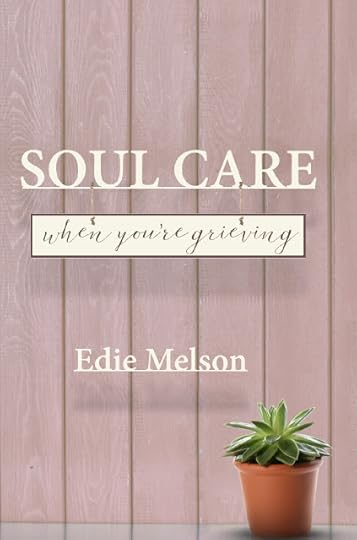
by Edie Melson @EdieMelson
Yep, the third book in my Soul Care series, published by Bold Vision Books, is coming out in just a few days. I'd like to share and short introduction and an excerpt. I hope you'll join us in our power buy day on Amazon, November 2, if you like what you see below!
Grief is difficult. We all experience it—and we experience it differently. There is no right or wrong way to face loss, yet many of us feel we’re doing it wrong. In this life, we mourn—the loss of someone
we love, the passing of a pet, the changes that come with age, even situations—these cause us to grieve. I wrote this book about the grief of all those situations and more. The exercises contained here aren’t geared to a specific situation, so they are appropriate for all kinds of loss.
Going through loss narrows my world. I used to believe that was my personal experience, but I’ve discovered it’s a common grief that happens to us all. I’m praying this book helps you break down the barriers created by grief and helps you engage with the world around you.
Most of all, I pray you learn to embrace your own process of grief and quit judging whether you’re handling things the way they should be handled. God designed each of us uniquely, and that blueprint includes the way we process loss.
Each chapter is designated by the opposite of one of the five experiences of grief. It’s far too easy to be tied to the common misconceptions about grief, so by reframing them, I’m hoping you’ll give yourself more grace as you process your loss.
These stages of grief are not steps or levels, they are just some common phases everyone goes through while they process loss. Don’t fall into the trap of believing they come in a certain order or that when you’ve experienced one of them, it won’t crop back up again.
Use this book to feed your soul when you’re grieving and know my prayer team and I have prayed over your personal journey. Remember, you are not alone in your grief. God is always with you—no matter whether or not you’re aware of Him.
 Waiting for Sunrise
The Lord is good to those who wait for him, to the soul who seeks him (Lamentations 3:25 ESV).
Waiting for Sunrise
The Lord is good to those who wait for him, to the soul who seeks him (Lamentations 3:25 ESV). We go to the beach a couple of times a year and my favorite time is on the beach when the sun rises, taking pictures. I also love watching the birds who hang out on and around the shore.
One year, the reason for being at the beach was to attend the memorial service of a close friend who had passed away. Although it was good to remember him with others who loved him, the trip was hard and the time I spent on the beach was more therapeutic than joyful. But during one of my early morning walks, God revealed a comforting truth.
As I watched the sun come up, I noticed how the birds gathered with me to watch the day begin. As I considered them, I realized birds always congregated whenever I’ve watched the sun rise. At the beach, they gather on the shore, many of them swooping in to land just a few minutes before the sun made its daily debut. In the mountains, they perch in the trees. And at the lake, they gather on the dock.
The birds gather for sunrise, but it doesn’t matter what the weather is like. The birds still come. It can be cloudless or completely overcast. It makes no difference. Those faithful avians still wait and watch the sunrise. Once the sun is up (and sometimes I can only tell it’s risen by my watch and the overall lightening of the sky) they disperse, winging away to their daily duties.
That day it occurred to me that the sunrise in my life was obscured—not by clouds—but by grief. Yet I knew God was still with me, no matter whether I saw Him working or not. And it was time to put action to my faith and—just like those birds—turn to where I knew He was. There’s no doubt it’s easier to walk with God when we can see a physical sign that He’s on the horizon. Even when grief makes us feel like everyone—including God has deserted us—we still must find the faith to face the dawn. Mourning can fill life with gloomy clouds until we’re no longer able to discern where God is or when He’s going to begin the work we can see. It’s during those times when we must rely on what we know is true about God instead of relying on what we’re feeling.
So that day, as I watched the sunrise behind a wall of clouds, I renewed my commitment to faith— God is always at work whether or not I see Him. He is always present, even when my circumstances hide Him from my view.
A Prayer About Watching for the Light The light shines in the darkness, and the darkness has not overcome it (John 1:5 ESV).
Dear Lord, sometimes my world feels so dark. I miss my loved one so much. And truthfully, I don’t want to live in the light. All I want to do is curl up in a corner and wait to join them. My world feels different, and I don’t want to
live this life. I want to go back and continue with all I had planned. Help me see purpose in the path ahead. But You have a purpose for me, a hope and a
reason for me to continue. I need to see a glimmer of what that is. I need a new spark in my cold heart. Help me draw nearer to You during this difficult time. Warm me with the flame of Your love and renew my hope. I feel Your love. I know You’ve been with me through all of this. Remind me of Your loving care.
Lead me to once again to watching for the light. Amen.
TWEETABLESoul Care When You're Grieving - @EdieMelson (Click to Tweet)
 Edie Melson is a woman of faith with ink-stained fingers observing life through the lens of her camera. No matter whether she’s talking to writers, entrepreneurs, or readers, her first advice is always “Find your voice, live your story.” As an author, blogger, and speaker she’s encouraged and challenged audiences across the country and around the world. Her numerous books reflect her passion to help others develop the strength of their God-given gifts and apply them to their lives. Connect with her on her website, through Facebook, Twitter and on Instagram.
Edie Melson is a woman of faith with ink-stained fingers observing life through the lens of her camera. No matter whether she’s talking to writers, entrepreneurs, or readers, her first advice is always “Find your voice, live your story.” As an author, blogger, and speaker she’s encouraged and challenged audiences across the country and around the world. Her numerous books reflect her passion to help others develop the strength of their God-given gifts and apply them to their lives. Connect with her on her website, through Facebook, Twitter and on Instagram.
October 29, 2021
Writing ABCs, 26 Things Every Writer Needs to Know
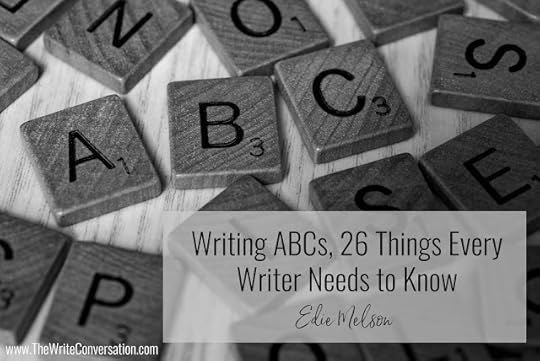
By Edie Melson @EdieMelson
Lately I've had a lot of folks ask me what it takes to become a writer.
The real answer takes hours, but today I decided to just boil it down to the basics.
I’ve done several of these ABC posts here on The Write Conversation and today I’m adding one more. I just can’t seem to help it, they’re so much fun to do.
The ABCs of Writing
A is for Adventure. The Writer’s life is definitely full of surprising twists and turns—we never know when we’ll be ambushed by an idea or spend half a day looking for just the right word.
B is for Balance. It’s easy to get overwhelmed with the writing life. We all need to practice a healthy balance.
C is for Cathartic. The experiences I’ve had in life always seem to creep into my writing, even if they’re unrecognizable to anyone else. Processing what I’ve been through with words has been a good thing.
D is for Discipline. To be a writer, you must…well…write. It’s not often easy, but it is fulfilling.
E is for Encourage. Yes, we need to encourage others with our words. But even more importantly, we need to use our words to encourage ourselves. Don’t be your own worst enemy by constantly talking down to yourself.
F is for Failure. Failure is an option, and anyone who’s told you differently is lying. I often learn more through failure than through success. It’s painful, but knowing something good comes out of my mistakes often makes them less painful.
G is for Gratitude. Having the freedom of being a writer is a gift I will never take for granted.
H is for Hard. Choosing to be a writer means a lifetime of hard work. It’s rewarding and satisfying, but not easy.
I is for Illustrate. Yes, that’s an artsy sort of word, but I chose it on purpose. Never forget that you are an artist and you illustrate life with words.
J is for Jealousy. It’s far too easy to compare our own journey with that of other writers. It’s easy, but not productive. Each of us has a different path and we need to be striving for excellence, not keeping score with one another.
K is for Knowledge. As writers, the education never ends. We never arrive at the place of knowing it all, so we’re always continuing our education.
L is Long. There are no shortcuts in the writing life. When we choose this path we need to remember to take the long view.
M is for Manna. For me, the words often appear only as I need them. They are gifts from God.
N is for Networking. I know, we’re all introverts and can’t stand the thought of interacting. But the truth is, we need each other. Not just to earn a living and get paid. We need one another for encouragement and to be reminded that we really aren’t crazy.
O is for Odd. That’s what writers are—odd. We look at things just a little differently from the rest of the world. That’s not something to be ashamed of, it’s a gift.
P is for Peace. We must learn to be content with our gift and the way it plays out. This business isn’t always fair, but things do tend to even out over time. To experience the heights of joy, we must be willing to walk through the valley’s of despair.
Q is for Quality over Quantity. It's easy to get caught up in the numbers game. We look for the number of words, the number of published pieces, the number of followers, reviews, etc. But it's the quality we need to focus on, no matter what the numbers say.
R is for Rhythm. Good writers know that words must have rhythm. There’s a certain cadence necessary for everything we write.
S is for Send. We were giving this gift of writing for a purpose. We’re being sent into the world to share what we’ve observed. This means we need to hit send and be willing to risk having others read what we’ve written.
T is for Trust. I need to trust that God has called me as a writer and that my words have value.
U is for Unique. So often writers struggle with the fact that they don’t have anything new to share. The truth is that each of us is one-of-a-kind. Even if we all write about the exact same thing, it will be from a different and unique perspective.
V is for Vanquish. There are lots of battles that come with the writing life and the most powerful is fear. We must face the fear we face and vanquish it.
W is for Want. We must each decide how much we want to write. Finding time to write is a lie. The truth is that we must carve out time to write. To do that, we must want it badly enough to give up some things to make it a priority.
X is for Xerophilous. This word means flourishing in a dry environment. As writers, we must write whether we’re in the mood or not. We write when we’re full and when we’re empty. Some of my best work has come by learning to flourish in a dry time.
Y is for Yes. It’s easy to say yes to doing something we know we can accomplish. The true test is saying yes, when we’re uncertain. Being a writer means saying yes—yes to new things, yes to impossible deadlines, and yes to always stretching and growing.
Z is for Zoo. And that’s about as good a description of the writing life as I've found!
These are the things I’ve come up with. I’d love to know what you’d add or change to my Writing Life Alphabet.
Don’t forget to join the conversation!
Blessings,
Edie
TWEETABLESWriting ABCs, 26 Things Every Writer Needs to Know - @EdieMelson (Click to Tweet)
 Edie Melson is a woman of faith with ink-stained fingers observing life through the lens of her camera. No matter whether she’s talking to writers, entrepreneurs, or readers, her first advice is always “Find your voice, live your story.” As an author, blogger, and speaker she’s encouraged and challenged audiences across the country and around the world. Her numerous books reflect her passion to help others develop the strength of their God-given gifts and apply them to their lives. Connect with her on her website, through Facebook, Twitter and on Instagram.
Edie Melson is a woman of faith with ink-stained fingers observing life through the lens of her camera. No matter whether she’s talking to writers, entrepreneurs, or readers, her first advice is always “Find your voice, live your story.” As an author, blogger, and speaker she’s encouraged and challenged audiences across the country and around the world. Her numerous books reflect her passion to help others develop the strength of their God-given gifts and apply them to their lives. Connect with her on her website, through Facebook, Twitter and on Instagram.
October 28, 2021
The Challenge for Every Book Author

The Challenge for Every Book AuthorBy Terry Whalin @terrywhalin
I love the rush of adrenaline when I type the final paragraph in a book project. My wife has heard me say this statement so many times: “Books are long.” Whether you are writing nonfiction or fiction, it takes a lot of effort, persistence and discipline to push through to get a first draft into your computer.
From my decades in publishing, when you reach this point, you should congratulate yourself. Over 80% of the U.S. population wants to write a book at some point during their lifetime but not everyone completes their manuscript. After this rush of gratitude from completion, another feeling springs into the process—which is going to be the theme of this piece: the challenge for every book author. I’m talking about deciding how you will publish your book.
Every author has many choices whether you go traditional or indie or self-publish. I’ve been involved in each of these aspects. Two of my book proposals received six-figure advances. And I have long stories which I will not include here about what happened with those books—and it’s not a success story. The crux of this challenge for every book author is to write the right story at the right time with the right publisher. Yes I understand I had a number of “rights” in that last sentence. Despite making careful author choices in this process, I know much of the actual success of a book is outside of an author’s direct control.
Our lives in publishing take continued hard work and taking action—even in the face of rejection. During a recent radio interview, the journalist mentioned my success and asked if I still faced rejection. Ironically that same week one of my current book projects had been cancelled—so yes I continue to face rejection and disappointment which are also a part of our lives in publishing. Yet being in the right place at the right time does not happen if you aren’t taking continued action.
New York Times bestselling author Andy Andrews struggled to get his first book; The Traveler’s Gift published. His submission was rejected multiple times before Thomas Nelson published the book. During the promotion Andy talks about giving away books “like it was water.” Many of those books did nothing to sell additional books. One of those books landed in Good Morning America’s offices. Producer (and not on the air at that time) Robin Roberts was responsible for selecting the first book for the launch of their book club. Roberts selected The Traveler’s Gift and it propelled the book to the New York Times list. Some would call this luck or happenstance, but I would call it persistence and perseverance with a lesson for every writer.
One of the key pieces for every author is a book proposal or business plan. Whether you are going to self-publish, go indie or traditional, you need this critical document which is completely separate from your manuscript. It doesn’t matter whether you are writing young adult novels or children’s books or nonfiction, every author needs this business plan.
In 2004 as a frustrated acquisitions editor looking for better submissions, I wrote Book Proposals That Sell . That book helped many writers find an agent, get an advance and book deal. Publishing has changed a great deal and now a revised edition of my book is out to help a new generation of writers. I understand the creative process is not perfect. Despite rejection, I encourage you to persist and keep looking for the right next step for you. As you faithfully move forward to achieve your dreams, rest assured that I’m taking the same consistent action for my own writing life.
How are you handling the challenges for book authors? Let me know in the comments below.
TWEETABLEAre you facing the challenge of every book author? Get insights from prolific editor and author @terrywhalin at #writinglife #pubtip (ClickToTweet)
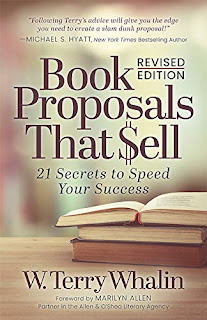 Book Proposals that $ell: 21 Secrets to Speed Your Success.
Terry Whalin
Book Proposals that $ell: 21 Secrets to Speed Your Success.
Terry WhalinWriting a book? In the beginning stages of writing a book, most people start with a blank page and write their entire manuscript. According to author and acquisitions editor W. Terry Whalin, this approach is backwards. About 80% to 90% of nonfiction books are sold from a book proposal. This mysterious document called a proposal contains many elements that will never appear in a manuscript—yet these details are critical to publishing executives who make the decision about publishing or rejecting an author’s project. In Book Proposals That Sell, Terry reveals 21 secrets to creating a book proposal that every author needs in order to create one that sells.
 W. Terry Whalin, a writer and acquisitions editor lives in Colorado. A former magazine editor and former literary agent, Terry is an acquisitions editor at Morgan James Publishing. He has written more than 60 nonfiction books including Jumpstart Your Publishing Dreams and Billy Graham. Get Terry’s recent book, 10 Publishing Myths for only $10, free shipping and bonuses worth over $200. To help writers catch the attention of editors and agents, Terry wrote his bestselling Book Proposals That $ell, 21 Secrets To Speed Your Success. The revised and updated edition released in October. You can get a free book proposal checklist. Check out his free Ebook, Platform Building Ideas for Every Author. His website is located at: www.terrywhalin.com. Connect with Terry on Twitter, Facebook and LinkedIn.
W. Terry Whalin, a writer and acquisitions editor lives in Colorado. A former magazine editor and former literary agent, Terry is an acquisitions editor at Morgan James Publishing. He has written more than 60 nonfiction books including Jumpstart Your Publishing Dreams and Billy Graham. Get Terry’s recent book, 10 Publishing Myths for only $10, free shipping and bonuses worth over $200. To help writers catch the attention of editors and agents, Terry wrote his bestselling Book Proposals That $ell, 21 Secrets To Speed Your Success. The revised and updated edition released in October. You can get a free book proposal checklist. Check out his free Ebook, Platform Building Ideas for Every Author. His website is located at: www.terrywhalin.com. Connect with Terry on Twitter, Facebook and LinkedIn.
October 27, 2021
For Writers: Finding the Right Word, Part 2
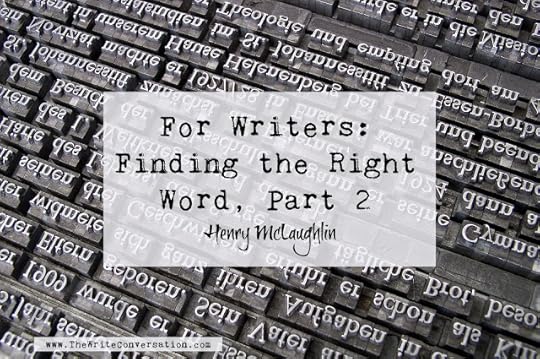
by Henry McLaughlin @RiverBendSagas
This week, I’m continuing the series on finding the right word. Let me emphasize again this is part of the editing process more than it is part of the creative process, especially the first couple of drafts. Those early drafts are to get the story out so we have something to work with. Finding the right word is part of editing when we look to improve the first draft by finding words that better express what we want to say. You can find the earlier post here: Writers: Finding the Right Word, Part 1.
Today, let’s talk about being descriptive. I touched briefly on in the previous post when I recommended using Synonym Finder by Rodale as a resource. How many ways can you think of to say eat? Here are a few suggestions from the Finder: break bread, dine, sup, nibble, devour, gobble up, gulp down, gorge, bolt, wolf, scarf, or pig out. The Finder or other thesaurus expands the possibilities to find the right word without drifting in pretentiousness or purple prose.
Say we place our protagonist in a city. We could name a specific city and let the readers’ knowledge of the place take them there. To make the experience deeper, to show it from the character’s perspective, we need a vivid description so the reader experiences the setting as the character does. Here is an example I use in my classes. I live near Fort Worth and downtown has an entertainment district called Sundance Square. Following is a description of how two characters experience Sundance Square on the same day and time.
Example 1The heat bears down on me, pressing me into the softened asphalt. Eleven o’clock at night and it’s still ninety degrees. The air reeks of ozone and booze, of cigarettes and pot, of sweat and over-heated perfume. Perspiration flows down my back, gluing my shirt to my skin. Neon flashes and stabs the night, lances of light burn through my eyes and into my skull. A door opens as I walk past a bar. The blast of air conditioning chills me. Country Western music twangs in my ears. Alcohol-fueled laughs and shouts echo off the buildings. Every third step someone bumps or jostles me. I constantly make sure my wallet is still in my pocket. Pizza and steak and Cajun aromas roil my stomach. Another two blocks to my car. Two blocks that stretch to two miles in a Twilight Zone haze. Why did I ever agree to come to Sundance Square on the Fourth of July?
Example 2The bright neon dazzles. A kaleidoscope of blue and red and orange and yellow, like a permanent fireworks display. I inhale. Steak. Pizza. Cajun. I’ve tasted it all tonight and I’m still hungry. Warm enough for cargo shorts, sandals, and a tank top. The warm weather has the girls dressed to keep cool. Their short skirts flounce around their bare legs. I walk by a bar as the door swings open. I stand and revel in the blast of air conditioning. A country band is singing an upbeat love song and the crowd two-steps to the rhythm, their boots stomping the hardwood floor. I smell the beer and remember anew the microbrews I enjoyed tonight. A whiff of perfume dances by me. Visions of bluebonnets fill my mind. Every two or three steps I pirouette with another person in a sidewalk ballet, laughing. I approach my car way before I expect it and thumb my key fob. Eleven o’clock. Way too early to leave Sundance Square, especially on the Fourth. But my boss wants me in at seven in the morning. I salute a cop as I drive away. Until next weekend, Sundance.
Finding the right word enables to create a physical world and an emotional world unique to our character. I recommend trying this exercise with a popular location in your area: an amusement park, a sports stadium, an entertainment district, neighborhood playground, your church.
May your writing be blessed.
TWEETABLEFor Writers: Finding the Right Word, Part 2 from Henry McLaughlin, @RiverBendSagas on @EdieMelson (Click to Tweet)
 Henry’s debut novel, Journey to Riverbend, won the 2009 Operation First Novel contest.
Henry’s debut novel, Journey to Riverbend, won the 2009 Operation First Novel contest.Henry edits novels, leads critique groups, and teaches at conferences and workshops. He enjoys mentoring and coaching individual writers.
Connect with Henry on his BLOG, TWITTER and FACEBOOK.
October 26, 2021
What Does a Writer Post on Facebook

by DiAnn Mills @DiAnnMills
Congratulations, writer! You’ve successfully launched a Facebook personal profile or group page. But followers aren’t jumping on to encourage you or praise your writing. Day after day, we see no growth or comments. What’s the problem? Perhaps the dilemma is rooted in what the writer is or isn’t posting.
4 Keys to Successful Facebook PostsContent is about our readers.Facebook algorithms favor lots of interaction.Photos and videos attract the readers’ eyes.Open-ended questions enlist comments from others.Content is KingPosting every day on Facebook can be a challenge, especially when best practices dictate our content should be in support of readers. The task is easy and fun if we develop a supply of general interest ideas and topics. Where do we find those gems?
Search online:Conversation starters for kids.Conversation starters for teens.Conversation starters for friends. Keep a file of topics and online links when your reservoir of ideas runs dry.Journaling promptsSeasonal inspirationPrayer requestsPraise requestsRecipesAsk for character or pet names for your next book and reward the person by mentioning them in the acknowledgments.Fun questions such as: You’re invited to a picnic. What are 3 things you’ll bring that begin with the first letter of your name?We are on our way to Mars. What did you forget that begins with the first letter of your birthday month?Ask about favorites! Use your imagination.Color, season, books, food, music, scripture, vacation, subject in school, grade schoolteacher, craziest thing you’ve done, etc.Share quotes and ask for feedback.Create memes from free sources such as www.pixabay.com or take your own photos.Ask for feedbackAsk for a titlePose a questionDevelop short videos that are funny, nature-filled, or inspiring.Consider a Facebook Live with Zoom book launch featuring giveaways, games, and giggles.Consider a Facebook Live with Zoom Christmas party featuring an ugly sweater contest.When a writer has a new release, develop posts that focus on themes and book content related to your reader’s needs or interests. Giveaways and incentives show the readers we are proud of our accomplishment and want to share our book cause of something beneficial to them.
A Word of Caution Avoid controversial topics that spur angry responses. Facebook is not the platform for a writer to advocate certain political views or religious convictions that condemn others.Avoid offensive language.Avoid posting vacation photos and videos until you’re home. No point in inviting a break-in.Avoid posting a child’s photo without parental permission.Enjoy Facebook! Those who are interested in your posts are friends. Treat them with kindness and respect. You won’t be disappointed.
TWEETABLEWhat Does a Writer Post on Facebook - tips from @DiAnnMills on @EdieMelson (Click to Tweet)
 DiAnn Mills is a bestselling author who believes her readers should expect an adventure. She creates action-packed, suspense-filled novels to thrill readers. Her titles have appeared on the CBA and ECPA bestseller lists; won two Christy Awards; and been finalists for the RITA, Daphne Du Maurier, Inspirational Readers’ Choice, and Carol award contests.
DiAnn Mills is a bestselling author who believes her readers should expect an adventure. She creates action-packed, suspense-filled novels to thrill readers. Her titles have appeared on the CBA and ECPA bestseller lists; won two Christy Awards; and been finalists for the RITA, Daphne Du Maurier, Inspirational Readers’ Choice, and Carol award contests. She is the former director of the Blue Ridge Mountain Christian Writers Conference, Mountainside Marketing Retreat, and Mountainside Novelist Retreat with social media specialist Edie Melson. Connect here: DiAnnMills.com
October 25, 2021
13 Reasons Living with a Writer Can Be Scary

By Edie Melson @EdieMelson
There are a lot of scary things about living with a writer. My husband and family know this only too well. Unfortunately, they’ve been subjected to just about everything on the list. And yet they still love me—even more than that they appear to enjoy my career choice at times.
Still, if you’re not expecting some of these things, they can be frightening. So since it’s Halloween, I thought I’d give those unsuspecting family members a sneak peak at the
13 Reasons Living with a Writer can Be Scary:
1. Going out in public can turn into a foray into the art and craft of eavesdropping. As writers—whether we writer fiction or nonfiction—we’re always looking for a good story. And I’ve found a lot of good stories by eavesdropping. For some reason this tendency makes my husband and family nervous.
2. Sometimes family members are drafted as impromptu actors when the resident writer is trying to accurately portray a scene. I'll just let your imagination run wild on this one. Trust me, it won't come close to the reality. 'nough said.
3. Normal dinner conversation can be off-putting for unsuspecting meal-time guests. For some reason people don’t like to discuss gory details during dinner—go figure.
4. Normal dinner conversation held at a restaurant can make those around you nervous. I remember the odd looks my husband and I got once while we were out. I was discussing different ways to kill people without leaving a trace. The looks from other diners were comical, to say the least.
5. Writer’s block is felt by the entire family. Ever hear the saying, if momma ain’t happy then nobody’s happy? Well if momma is a writer, then that’s doubly true of writer’s block.
6. Normal hours aren’t so normal. Writers write when inspiration hits. Hopefully that’s during daylight hours. But if the muse works the graveyard shift, so does the writer. Beyond that, if inspiration strikes at night, experienced writers know to write it down because it won't stick around until morning. It's the writing it down part that can cause family members difficulty. Imagine lights snapped on at 2am, loud exclamations as sleep-fogged writer tries to find a pen that works and something to write on. You get the idea. Inspiration isn't quiet.
7. Writers have an insatiable curiosity. I believe that trait is one of the reasons many of us are so successful. We go through life with a goal of finding out who, what, when, where, why and how. My husband refers to this as being nosy, but I think it’s a trait that’s stood me in good stead with my chosen career.
8. Writers don’t just write books, they also collect them. For some reason reading and writing go hand in hand. This means stacks of books everywhere. If you live with a writer, just get used to it. This is one battle you’ll never win.
9. Family situation frequently end up in print. Oh don’t worry too much, we’re careful to change the names. But the tendency of writers to write what we know, can almost always leave a trail back home.
10. Writers have a love/hate relationship with technology, especially computers. We all have our favorite brands and are fiercely loyal (can anyone say Apple?). But we also are the first ones to rail against the necessity of relying on such temperamental beasts.
11. Writers wear their hearts on their sleeves. A good review puts us over the moon. A bad review makes us vow to give up writing altogether. Just get ready for it, we’re an emotional bunch.
12. And along that line, writers are insecure. No matter how many good comments we get, it’s the one bad one that we’ll remember. We’ll dissect it, analyze it, and agonize over it for weeks.
13. We’re always afraid our last book (article, devotion, blog post, etc) was the last one we have in us. We’re certain we’ve reached the pinnacle of our career and the rest won’t be worth reading.
This is my list of the scariest things about living with a writer. I'd love to know what you'd add to the list. Be sure to leave your thoughts in the comments section below.
Don't forget to join the conversation!Blessings,Edie
TWEETABLE13 Reasons Living with a Writer Can Be Scary - @EdieMelson (Click to Tweet)
 Edie Melson is a woman of faith with ink-stained fingers observing life through the lens of her camera. No matter whether she’s talking to writers, entrepreneurs, or readers, her first advice is always “Find your voice, live your story.” As an author, blogger, and speaker she’s encouraged and challenged audiences across the country and around the world. Her numerous books reflect her passion to help others develop the strength of their God-given gifts and apply them to their lives. Connect with her on her website, through Facebook, Twitter and on Instagram.
Edie Melson is a woman of faith with ink-stained fingers observing life through the lens of her camera. No matter whether she’s talking to writers, entrepreneurs, or readers, her first advice is always “Find your voice, live your story.” As an author, blogger, and speaker she’s encouraged and challenged audiences across the country and around the world. Her numerous books reflect her passion to help others develop the strength of their God-given gifts and apply them to their lives. Connect with her on her website, through Facebook, Twitter and on Instagram.
October 24, 2021
What to do When a Writer Gets Discouraged

by Ane Mulligan @AneMulligan
When I began writing my first manuscript, I was so sure I’d be published right away. And why not? It was brilliant. A wonderful story of Biblical characters we all know and love. What’s not publishable in that?
I soon found out.
Home, home in our gigWhere publishers play flip-your-wigWhere seldom is heardAn encouraging wordAnd nobody gives a fig
Yes, I've experienced discouragement in my writing journey. Maybe it was a rejection, or comments from a contest judge, but they threw ice cubes on my dreams.
I soon realized discouragement was not getting me anywhere and definitely not published. So, after I kicked a cabinet or two, I pulled up my big girl britches, toned my rhino skin and got over it.
The thing is I’ve never wanted to be told my work is wonderful if it isn't. How mortifying would that be? And how untruthful by the teller.
Iron sharpens iron
I was blessed to find critique partners who love me enough to push me hard. We can't get our feelings hurt if we're told something doesn't work—not if we're serious about publishing.
If you're serious, then you refuse discouragement. Turn your back on it, because it doesn't come from God.
Now, before y'all string me up, I realize new writers are more sensitive than the veterans. But if you really want to publish that puppy you've invested so much time on, you've got to get over it.
This industry is subjective and it's competitive. To get ahead, you have to be one of the best. So, here's my advice.
When you get discouraged, follow these steps:Set the critiques or judge's comments aside for 3 days.On the 4th day, take what profits your work and learn from it.Make Mardi Gras confetti out of the rest.On the flip side, if you're a critique partner or a contest judge, use care with your words. Be sure you are critiquing the work not the writer. You can be tough and still deliver it with a gentle, encouraging hand.
The great theologian Mary Poppins said (paraphrasing Proverbs 12:25), "A spoonful of sugar helps the medicine go down." It's all in the manner the critique is delivered. Don't soften wise counsel, but deliver it with a loving heart.
Finally, if you're struggling with a sensitive spirit, read Proverbs through once with your writing career as the focus. Substitute the word "father" or "mother" with "critique partner" and "judge." Wow! What an eye-opener.
TWEETABLEWhat to do When a Writer Gets Discouraged, encouragement from author @AneMulligan on @EdieMelson (Click to Tweet)
 Ane Mulligan has been a voracious reader ever since her mom instilled within her a love of reading at age three, escaping into worlds otherwise unknown. But when Ane saw Mary Martin in PETER PAN, she was struck with a fever from which she never recovered—stage fever. She submerged herself in drama through high school and college. Years later, her two loves collided, and a bestselling, award-winning novelist emerged. She resides in Sugar Hill, GA, with her artist husband and a rascally Rottweiler. Find Ane on her WEBSITE, AMAZON AUTHOR PAGE, FACEBOOK, TWITTER, INSTAGRAM, PINTEREST and THE WRITE CONVERSATION.
Ane Mulligan has been a voracious reader ever since her mom instilled within her a love of reading at age three, escaping into worlds otherwise unknown. But when Ane saw Mary Martin in PETER PAN, she was struck with a fever from which she never recovered—stage fever. She submerged herself in drama through high school and college. Years later, her two loves collided, and a bestselling, award-winning novelist emerged. She resides in Sugar Hill, GA, with her artist husband and a rascally Rottweiler. Find Ane on her WEBSITE, AMAZON AUTHOR PAGE, FACEBOOK, TWITTER, INSTAGRAM, PINTEREST and THE WRITE CONVERSATION.
October 23, 2021
10 Ways to Face Your Writing Fears
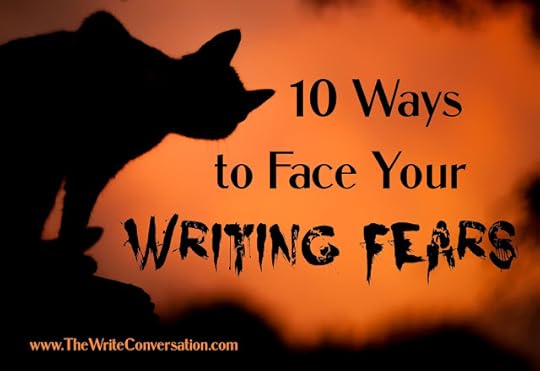
by Edie Melson @EdieMelson
Fall is upon us and with it come black cats and trick or treaters. Some cute and some . . . well . . . not so much. In this season of black and orange, I thought I'd highlight some fears all writers face and how to overcome them.
At a recent writing conference, I was talking to a friend of mine and this person confided she was afraid she just didn’t have what it took to be a writer.
“I’m just not good enough to get a book published, and I don’t know if I ever will be.”
“Welcome to the club,” I told her.
My answer wasn’t what she expected. She had forgotten something we had heard together at a conference many years ago. We’d been listening to an established author talk about his own fear and inadequacies. He told the audience that every time he sits down to write a new book, the fears resurface and he’s certain he no longer has what it takes to make it in publishing.
Hearing him confess his own fears gave me hope. Beyond that, it brought home an important fact. Being published—no matter if it’s a single book or a hundred—won’t necessarily make the fear disappear.
So what’s a writer to do?
10 Tips to Help You Face Your Writing Fears
1. Pray First. Yep, EVERY SINGLE TIME. I've learned—the hard way—that before my fingers hit the keyboard, I pray. I don't care if I'm writing a blog post, working on a book, or scheduling social media. God has a purpose for every single keystroke. And I for one, want to make sure I'm focused on His purpose instead of mine.
2. Write Regularly. For some of us that means daily. For others it means on the weekend, or three days a week. The truth is, mood is a fickle mistress and time is NEVER lying around waiting to be found!
3. Choose to Ignore the Negative Voices in Your Head. We all have them—those irritating whispers that tell us we’re not good enough, and we’re selfish to even try to follow our dreams. We can write anyway, or we can cave in to our insecurities. Published writers keep writing, no matter what those voices say.
4. Write Outside Your Comfort Zone. The publishing industry is in a constant state of change. What you write today, may not be popular five years from now. As a writer, you’ll have to constantly be changing and growing. Get used to it now and avoid the deer-in-the-headlights reaction when change comes your way.
5. Find a Writing Community. This is a tough enough business without trying to fly solo. We all need fellow writers who understand what we’re doing. These fellow travelers will keep us accountable and encourage us when we think we can’t go any further.
6. Write When You Don’t Have the Time. So often I hear people who want to be published talk about how they’ll start when they find the time. The truth is that time is NEVER lying around waiting to be found. Following our dreams takes sacrifice. We must be willing to make the hard choices and carve out time to write.
7. Stay Active in the Industry. Join writing groups—locally and online. Give back to the writing community at large by volunteering to help others. Trust me when I tell you that no matter where you are in your writing journey, there are those less experienced. And by staying active, it’s harder to quit. The times I’ve wanted to throw in the towel it was having to answer to others that kept me going.
8. Write When You’re NOT Inspired. We cannot wait for the mood strike to write. Inspiration is a fickle mistress. If we’re serious about pursuing publishing dreams, we must move beyond depending on our mood to be able to write.
9. Remind Yourself Why You Write. For me, written words are the way I process life. I don’t talk things out, I write things out. God designed me to be like this. Writing is His gift to me. I have those words taped above my desk so I’ll never forget.
10. Write Through the Fear. Being a published writer goes hand in hand with fear. We’re afraid we won’t be good enough to be published, then that no one will read the book, and finally that we won’t be able to write another book.
These are my tips to help me face my writing fears. What would you add to the list? Be sure to share your thoughts in the comments section below.
Don’t forget to join the conversation!Blessings,Edie
TWEETABLE10 Ways to Face Your #Writing Fears, inspiration from @EdieMelson (Click to Tweet)
 Edie Melson is a woman of faith with ink-stained fingers observing life through the lens of her camera. No matter whether she’s talking to writers, entrepreneurs, or readers, her first advice is always “Find your voice, live your story.” As an author, blogger, and speaker she’s encouraged and challenged audiences across the country and around the world. Her numerous books reflect her passion to help others develop the strength of their God-given gifts and apply them to their lives. Connect with her on her website, through Facebook, Twitter and on Instagram.
Edie Melson is a woman of faith with ink-stained fingers observing life through the lens of her camera. No matter whether she’s talking to writers, entrepreneurs, or readers, her first advice is always “Find your voice, live your story.” As an author, blogger, and speaker she’s encouraged and challenged audiences across the country and around the world. Her numerous books reflect her passion to help others develop the strength of their God-given gifts and apply them to their lives. Connect with her on her website, through Facebook, Twitter and on Instagram.Photo by Sašo Tušar



